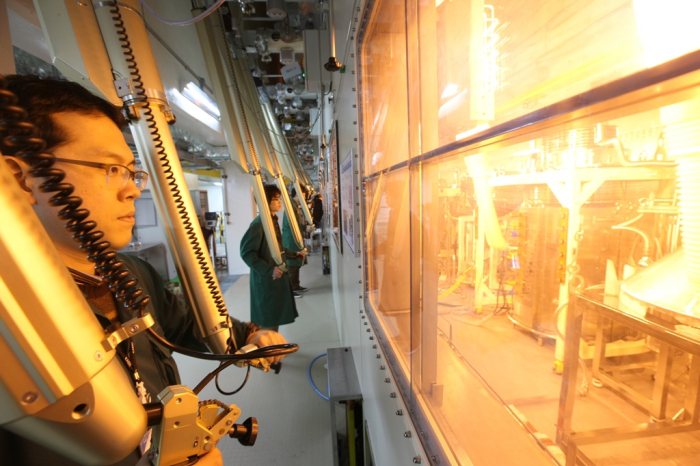[Exclusive] Energy
US, Korea approve nuclear fuel recycle technology
Joint research team secures the worldŌĆÖs first Pyro-SFR technology capable of processing 4-5 kg of fuel roads
By Sep 02, 2021 (Gmt+09:00)
3
Min read
Most Read
S.Korea's LS Materials set to boost earnings ahead of IPO process


CarlyleŌĆÖs Rubenstein sees commercial real estate undervalued


Samsung Electronics' key M&A man returns; big deals in the offing


Money pours in for technology to reshape Korean restaurants


CJ CheilJedang to sell feed, livestock unit for $1.4 bn



The United States and South Korea authorities officially endorsed the results of a joint research on Pyro-SFR, a cutting-edge technology that recycles fuel rods from nuclear power plants as fuel for the sodium-cooled fast reactor (SFR). The approval is expected to help South Korea utilize more than 17,500 tons of the spent nuclear fuel that have been accumulated since 1978 when the country started operations of its first nuclear power plant.
The management committee of Joint Fuel Cycle Studies (JFCS), a research project between the two countries to reduce fuel rods, approved a report on the results of studies that Korea Atomic Energy Research Institute (KAERI) and US national institutions such as Idaho National Laboratory and Argonne National Laboratory conducted for some 10 years, according to South KoreaŌĆÖs Ministry of Science and ICT on Sept. 1.
The committee includes the US Department of State, the Department of Energy and the National Nuclear Security Administration, as well as South KoreaŌĆÖs Ministry of Foreign Affairs, the Ministry of Science and ICT and the Nuclear Safety and Security Commission.
The JFCS report covered extensive research on Pyro-SFR such as its technical and economic feasibility. The report of about a thousand pages was known to conclude that it is in the stage to start follow-up research for the commercialization of Pyro-SFR, although the two countries agreed not to reveal details of the report.
Pyro-SFR is a process that unable to produce plutonium for nuclear weapons. Power companies run by billionaire friends Bill Gates and┬ĀWarren Buffett were slated to launch a SFR project, seeing it as ŌĆ£a game-changer for the energy industry.ŌĆØ
TO HELP KOREA UTILIZE GROWING FUEL RODS
Spent nuclear fuel needs to go through several stages of storage since it is very radioactive. It should be temporarily placed in a water tank at a nuclear power plant for about five years and moved to a dry storage facility. In addition, it also needs some intermediate storage facilities and an underground research laboratory (URL), a special facility that can completely bury 500 meters below the ground level.
In South Korea, all of fuel rods have been stacked at nuclear power plants since the country does not have the intermediate facilities and the URL. The nation stored 17,578 tons of the spent nuclear fuel as of June.
The fuel rods are increasing more quickly than power plants can handle. For example, Wolsong nuclear power plants used 98.2% of storage facilities as of June, which could force to shut down the units in March next year.
Pyro-SRL is expected to help those plants to utilize spent nuclear fuel since the technology allows to process transuranic waste (TRU) in fuel rods for recycle in accordance with the nuclear non-proliferation principle.
Pyro-SFR can produce electricity without carbon emission by extracting TRU, which accounts for about 1% of spent nuclear fuel, and then re-injecting it as SFR raw material.
The JFCS report said the US-Korea research team secured the worldŌĆÖs first original Pyro-SFR technology capable of processing 4-5 kg of fuel roads each time.
South KoreaŌĆÖs science and ICT ministry is slated to conduct empirical studies and set up commercialization plan on the technology within this year. However, it is unclear whether the plan will be realized within the term of the current Moon Jae-in administration as it is sticking to the phase out of nuclear power.
Write to Hae-Sung Lee at ihs@hankyung.com
Jongwoo Cheon edited this article.
More to Read
-
 Korean chipmakersSouth KoreaŌĆÖs chip design firms go abroad to tap $426 billion market
Korean chipmakersSouth KoreaŌĆÖs chip design firms go abroad to tap $426 billion market7 HOURS AGO
-

-

-

-

Comment 0
LOG IN


